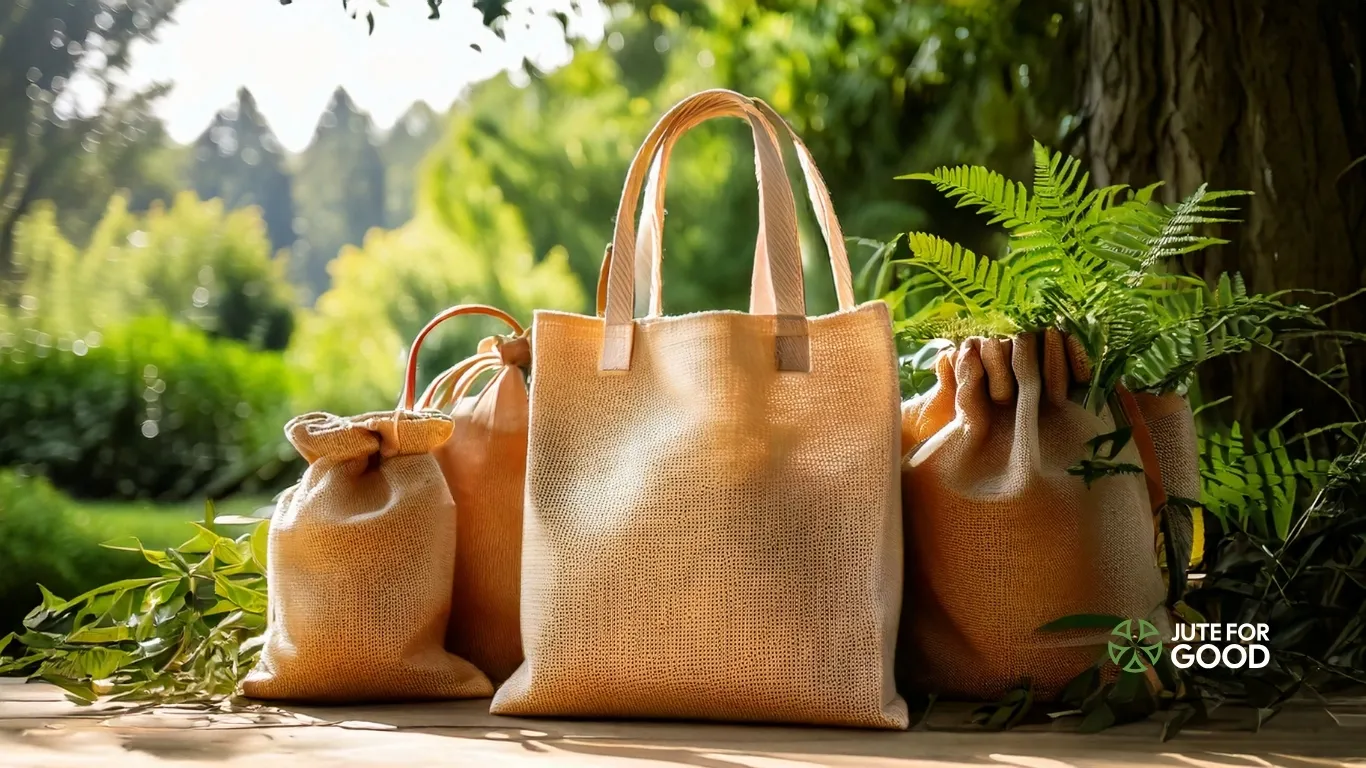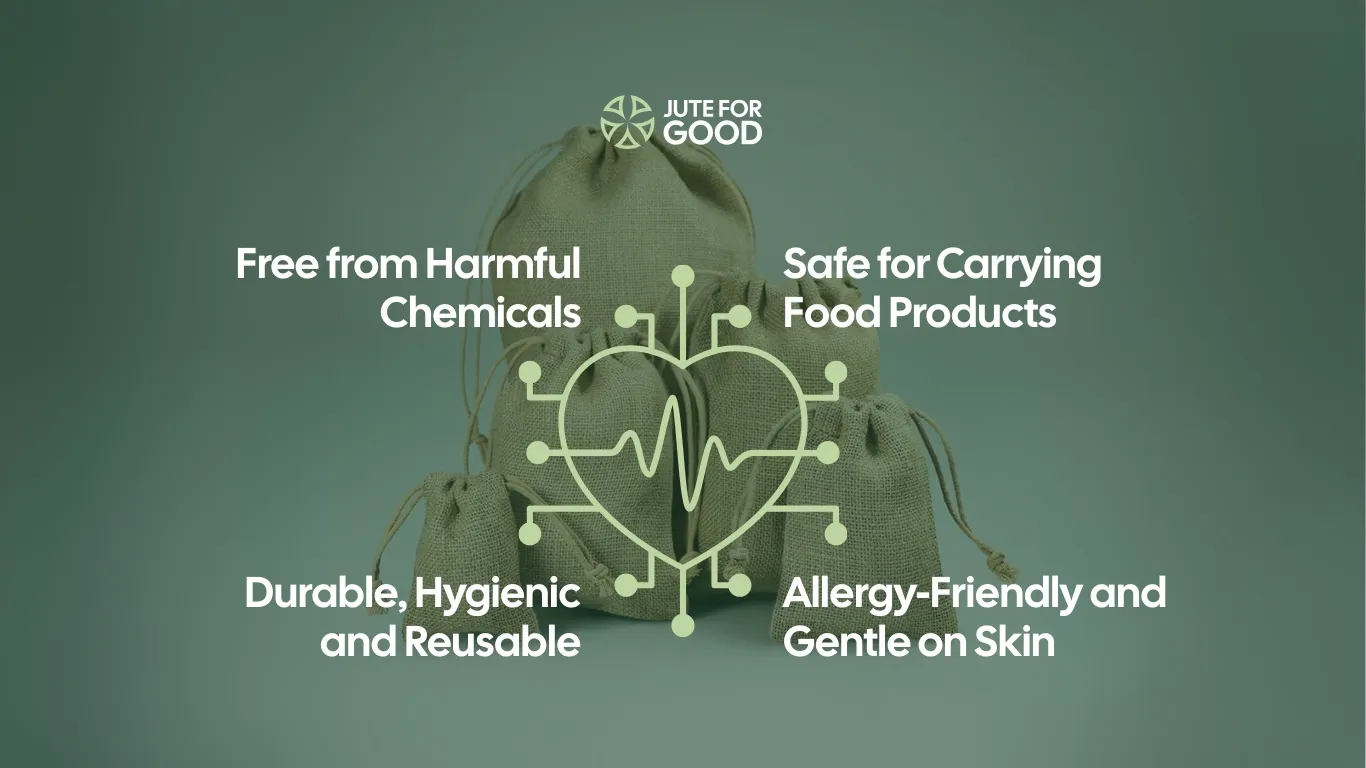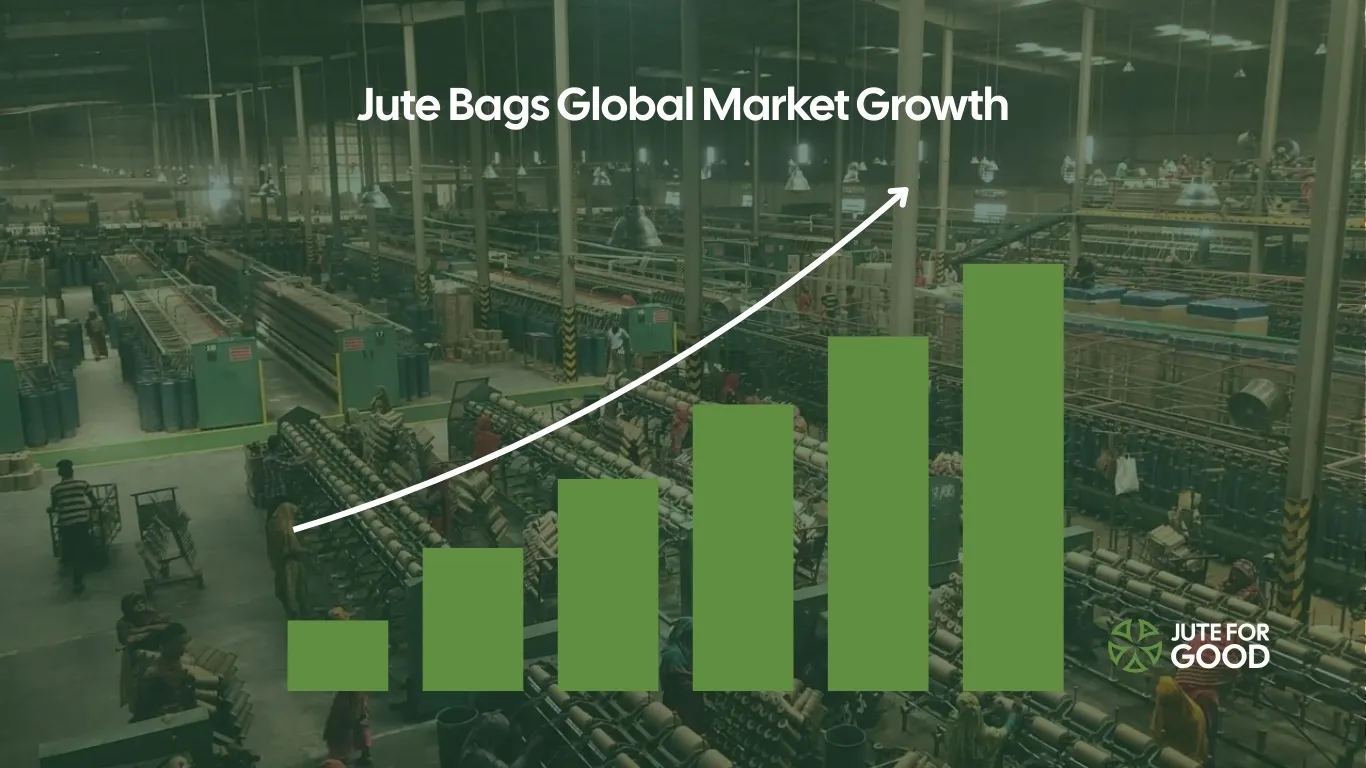Every year, people use about 500 billion plastic bags worldwide. Most of them are used for only 12 minutes before being thrown away. They end up in landfills, rivers, or oceans, where they can take 500 to 1000 years to break down. This waste harms soil, water, and wildlife.
Because of this global problem, more people and businesses are searching for eco-friendly alternatives. One of the best solutions is the jute bag.
Jute bags are made from natural plant fiber. They are strong, reusable, and safe for the planet. They also look stylish and can serve many purposes. In this guide, we will explore the many benefits of jute bags for the environment, daily life, and business.
What Makes Jute Special?
Jute is a natural fiber that grows mainly in Bangladesh and India. Farmers grow jute in warm, humid areas with plenty of rain. It is often called the “golden fiber” because of its shiny golden-brown color.
Unlike synthetic fibers, jute comes directly from nature. Jute is fully biodegradable and renewable. The crop grows fast and does not need heavy chemical use. This makes it one of the most sustainable fibers in the world.
When we compare jute to other common bag materials:
- Plastic bags harm the environment and take centuries to decompose.
- Paper bags are eco-friendly but weak and tear easily.
- Cotton bags are reusable but need a lot of water and pesticides to produce.
- Jute bags offer the perfect balance of strength, durability, and sustainability.
Environmental Benefits of Jute Bags
Plastic bags cause lasting damage to the planet, but jute bags offer a safe and natural alternative. They protect soil, water, and air while reducing waste. Choosing jute is not just about carrying goods, it is about protecting the environment for future generations.

Biodegradable and Compostable
Jute bags return to the soil within months. They do not leave harmful waste behind. Unlike plastic, they do not pollute land and water.
Low Carbon Footprint
Jute plants absorb large amounts of carbon dioxide and release oxygen. This helps fight climate change. The crop also grows with less water and fertilizer compared to cotton.
Reduces Plastic Pollution
Each time someone uses a jute bag, it replaces dozens of plastic bags. This simple switch helps reduce plastic waste and protects wildlife.
Recyclable and Reusable
Old jute bags can be recycled into new products such as ropes, mats, or paper. Even after years of use, they continue to serve a purpose.
Practical Benefits of Jute Bags
Jute bags are not only good for the environment, they are also very useful in daily life. They are strong, reliable, and easy to use for many purposes. From shopping to storage, jute bags offer practical advantages that other materials cannot match.
Strength and Durability for Heavy Loads
Jute bags are designed to carry weight without tearing. They can hold groceries, books, clothes, or even large household items. This makes them a dependable choice for everyday use.
Long Lifespan with Regular Use
Unlike paper or thin plastic bags that rip quickly, jute bags can last for years if handled with care. A single jute bag can replace hundreds of single-use bags, making it both cost-saving and eco-friendly.
Breathable Fabric for Freshness
The natural fiber of jute allows air to circulate. This is helpful when storing fruits, vegetables, or grains because it keeps them fresh for longer and reduces the chance of mold.
Resistance to Wear and Tear
Jute fibers are tough and flexible. They do not stretch out of shape easily, even after regular use. This means the bag stays strong and keeps its form over time.
Economic Benefits of Jute Bags
Jute bags are not only eco-friendly and practical, they also bring strong economic value. They create jobs, support industries, and open global trade opportunities. Choosing jute helps both local communities and international businesses grow together.
Cost-Effective for Businesses in the Long Run
Buying jute bags in bulk is affordable. Since these bags are reusable and last for years, companies save money compared to frequently restocking cheap plastic or paper bags. In addition, branded jute bags double as marketing tools, reducing advertising costs.
Supports Farmers and Local Industry Growth
Jute cultivation and bag production provide jobs to millions of farmers, factory workers, and artisans in Bangladesh and India. Each purchase of jute bags directly supports rural communities, strengthens the local economy, and keeps traditional industries alive.
Boosts Export and Global Trade Opportunities
Bangladesh and India are leading exporters of jute products. The global market for jute bags is expanding quickly due to plastic bans and rising demand for sustainable packaging. This growth gives exporting countries a competitive advantage while offering importers eco-friendly solutions.
Style and Customization Benefits
Jute bags are not only strong and eco-friendly, they are also attractive. They can be designed in many ways to match personal style or business branding. This makes them a smart choice for both daily use and promotional purposes.
Stylish Designs for Everyday Use
Jute bags are available in many shapes, sizes, and colors. From simple shopping bags to trendy tote bags, they can match casual wear, office use, or even travel needs. Their natural golden fiber also gives them a unique and classy look.
Perfect for Branding and Promotion
Businesses can easily print logos, slogans, or designs on jute bags. These bags act like moving billboards. When customers carry them in public, the brand gains free exposure and visibility, creating long-term marketing value.
Multiple Uses Beyond Shopping
Jute bags are versatile. They are not limited to carrying groceries. They are widely used as gift bags, conference giveaways, wine bottle covers, beach totes, or even stylish handbags. This flexibility makes them suitable for many occasions.
Health and Safety Benefits of Jute Bag
Jute bags are not just safe for the environment, they are also safe for people. Since they are made from natural plant fiber, they do not contain harmful chemicals found in many plastic products. This makes them a healthier choice for carrying food and daily items.

Safe for Carrying Food Products
Jute is a natural fiber that does not release toxins. This makes jute bags suitable for storing or carrying fruits, vegetables, bread, and grains. Many food businesses prefer them for safe packaging.
Free from Harmful Chemicals
Unlike plastic bags that may release toxic substances when exposed to heat or sunlight, jute bags are chemical-free. They keep food items fresh without risk of contamination.
Allergy-Friendly and Gentle on Skin
Jute fiber is plant-based and generally does not cause skin irritation or allergies. People with sensitive skin can use jute bags without worry, unlike some synthetic materials.
Global Trends and Market Demand of Jute Bag
The demand for jute bags is rising worldwide as people, businesses, and governments move away from plastic. More countries are promoting eco-friendly packaging, and jute has become a top choice for its strength and natural appeal.

1. Government Bans Driving Growth
Many countries in Europe, Asia, and Africa have banned or restricted single-use plastics. This has created huge demand for jute bags as an eco-friendly replacement. Policies are encouraging both consumers and retailers to adopt sustainable packaging.
2. Rising Popularity in Global Markets
Jute bags are now widely used in Europe, the USA, the Middle East, and Asia. Consumers prefer them for shopping, travel, and daily use. Businesses choose them for packaging and promotions because they are both practical and sustainable.
3. Part of the Eco-Friendly Fashion Trend
In addition to shopping bags, jute is being used in fashion as stylish totes, handbags, and accessories. This trend has made jute bags more appealing to younger generations who want eco-conscious lifestyle products.
4. E-Commerce Boosting Demand
With the rise of online shopping, many retailers and e-commerce brands now offer jute bags as packaging or add-on items. This shift is expanding the global market and making jute products more accessible.
Why Choose Jute Bags Over Cotton or Paper?
Many people think all natural bags are equal, but there are clear differences between jute, cotton, paper, and plastic. Jute stands out because it balances eco-friendliness, strength, and cost.
Jute vs. Cotton: Lower Resource Use
Cotton bags are reusable, but growing cotton requires huge amounts of water and pesticides. In comparison, jute grows faster with little need for irrigation or chemicals. This makes jute far more sustainable and less damaging to the environment.
Jute vs. Paper: Stronger and Longer Lasting
Paper bags are biodegradable but weak. They tear easily, especially when wet, and cannot carry heavy loads. Jute bags are strong, durable, and reusable for years, making them a better long-term choice.
Frequently Ask Questions
1. Are jute bags washable?
Yes, jute bags can be washed by hand with mild soap. Avoid machine washing, as it may damage the fibers.
2. How long do jute bags last?
With good care, a jute bag can last for 2 to 5 years or more.
3. Can jute bags be used for food packaging?
Yes, they are safe for storing and carrying food items.
4. Why are jute bags eco-friendly?
Because jute bags are made from natural fiber, they are biodegradable, compostable, and renewable.
5. Are jute bags more expensive than plastic bags?
Yes, but they are reusable and long-lasting, making them cheaper in the long run.
Conclusion
Jute bags are more than just an eco-friendly alternative. They offer strength, style, and safety for daily life. They also support local farmers and industries, making them a smart choice for both individuals and businesses.
By switching to jute, we reduce plastic pollution and promote a cleaner planet. Whether for shopping, branding, or personal use, jute bags are the right choice for today and the future.
If you are looking for bulk eco-friendly jute bags, contact us today.
